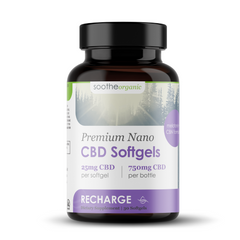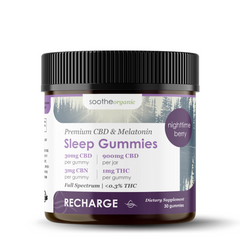Cannabis and hemp plants have captured widespread attention for their potential therapeutic benefits, thanks to compounds called cannabinoids. Among these, Cannabigerolic Acid (CBGA) and Cannabigerol (CBG) stand out as the "mother cannabinoids" because they serve as precursors to many other cannabinoids, including the well-known Cannabidiol (CBD) and Tetrahydrocannabinol (THC). While CBGA transforms into other cannabinoids as the plant matures, CBG is gaining recognition for its unique health benefits. This article explores the properties, potential benefits, and current research on CBGA and CBG, offering insights into how these compounds may support wellness.
Key Points
-
CBGA as a Precursor: CBGA is the foundational cannabinoid in cannabis and hemp, converting into THC, CBD, and other cannabinoids, making it essential for plant development and therapeutic potential.
-
Non-Psychoactive Nature: Both CBGA and CBG are non-intoxicating, meaning they don’t produce a "high" like THC, making them appealing for health-focused applications.
-
Emerging Benefits: Research suggests CBGA and CBG may offer anti-inflammatory, antioxidant, neuroprotective, and antibacterial benefits, though more studies are needed to confirm efficacy and safety.
-
Complementary to CBD: CBG may enhance the effects of CBD for joint and muscle pain or CBD for depression and mood through the entourage effect, where cannabinoids work synergistically.
-
Research Gaps: While promising, the science on CBGA and CBG is in early stages, and their long-term effects and interactions with medications require further investigation.
Understanding CBGA and CBG
CBGA is the starting point for most cannabinoids in cannabis and hemp plants. As the plant grows, enzymes convert CBGA into other compounds like THC, CBD, and Cannabichromene (CBC). CBG, the non-acidic form of CBGA, emerges through decarboxylation (exposure to heat or light) and is present in smaller amounts in mature plants, typically less than 1%. Both compounds interact with the body’s endocannabinoid system, which regulates functions like mood, pain, and inflammation, but they do so in distinct ways compared to CBD or THC.

Understanding CBGA and CBG
CBGA is the starting point for most cannabinoids in cannabis and hemp plants. As the plant grows, enzymes convert CBGA into other compounds like THC, CBD, and Cannabichromene (CBC). CBG, the non-acidic form of CBGA, emerges through decarboxylation (exposure to heat or light) and is present in smaller amounts in mature plants, typically less than 1%. Both compounds interact with the body’s endocannabinoid system, which regulates functions like mood, pain, and inflammation, but they do so in distinct ways compared to CBD or THC.
Potential Health Benefits
Research suggests CBGA and CBG may offer several health benefits, though findings are preliminary. CBGA shows promise in reducing inflammation and oxidative stress, potentially supporting cardiovascular health and neuroprotection. CBG, meanwhile, has been studied for its anti-inflammatory, antibacterial, and pain-relieving properties, making it a candidate for conditions like colitis or neuropathic pain. Both may complement CBD oil for pain relief or CBD calming tincture uses, enhancing overall wellness.
Using CBGA and CBG Products
CBGA and CBG are available in forms like oils, tinctures, and CBD softgel uses, similar to CBD products. These can be taken sublingually, ingested, or applied topically for localized relief. When choosing products, opt for reputable brands with third-party lab testing to ensure quality and potency. Always consult a healthcare provider before use, especially if taking medications, as interactions are not fully understood.

Legal Considerations
The legal status of CBGA and CBG varies by state. While the 2018 Farm Bill legalized hemp-derived products with less than 0.3% THC, state laws may differ, so it’s wise to check local regulations before purchasing.
Discovering the Mother Cannabinoid: CBGA & CBG
Cannabis and hemp plants have become a focal point in health and wellness discussions due to their array of cannabinoids, each offering unique potential benefits. Among these, Cannabigerolic Acid (CBGA) and Cannabigerol (CBG) are often called the "mother cannabinoids" because they serve as the biochemical precursors to many other cannabinoids, including Cannabidiol (CBD) and Tetrahydrocannabinol (THC). While CBGA is primarily converted into THC and CBD as the plant matures, CBG has emerged as a compound of interest for its potential therapeutic properties. This article delves into the science behind CBGA and CBG, their potential health benefits, how they compare to CBD, and how they can be incorporated into wellness routines.
What is CBGA?
CBGA is a foundational cannabinoid found in cannabis and hemp plants, playing a critical role in the plant’s growth and the formation of other cannabinoids. Often referred to as the "granddaddy" of cannabinoids, CBGA is synthesized from olivetolic acid and geranyl pyrophosphate through the action of CBGA synthase. As the plant matures, enzymes like THCA synthase and CBDA synthase convert CBGA into tetrahydrocannabinolic acid (THCA), cannabidiolic acid (CBDA), and cannabichromenic acid (CBCA), which later become THC, CBD, and CBC, respectively, through decarboxylation (exposure to heat or light) (CBGA Biosynthesis).
CBGA is non-intoxicating, meaning it does not produce a psychoactive "high" like THC. It interacts with the body’s endocannabinoid system, potentially making it more receptive to other cannabinoids, which may enhance their effects. CBGA also supports natural leaf necrosis in cannabis plants, helping direct energy toward flower development (CBGA Overview). Despite its low concentration in mature plants, CBGA’s potential health benefits are drawing research interest.
Potential Health Benefits of CBGA
Research on CBGA is in its early stages, but preliminary studies suggest several promising benefits:
-
Anti-inflammatory Properties: A study published in Scientific Reports found that CBGA reduced inflammation and fibrosis in a cisplatin-induced kidney injury model, outperforming CBD in suppressing inflammatory cytokines (CBGA in Nephropathy). This suggests potential for managing inflammatory conditions.
-
Antioxidant Effects: CBGA may combat oxidative stress, a contributor to chronic diseases like cardiovascular disorders and neurodegeneration (CBGA Benefits).
-
Neuroprotection: Early research indicates CBGA may have neuroprotective properties, potentially supporting conditions like Alzheimer’s or Parkinson’s, though human studies are needed (CBG vs CBGa).
-
Cardiovascular Health: CBGA may help reduce inflammation and oxidative stress in the cardiovascular system, supporting heart health (CBGA and Heart Health).
These findings are preliminary, and more clinical trials are necessary to confirm CBGA’s efficacy and safety for human use.
What is CBG?
CBG is the non-acidic form of CBGA, formed through decarboxylation when CBGA is exposed to heat or light. Unlike THC, CBG is non-psychoactive, making it an attractive option for those seeking therapeutic benefits without a "high." CBG is typically found in low concentrations (less than 1%) in mature cannabis plants, which makes CBG-rich products rarer and often more expensive (CBG Overview).
CBG interacts with the endocannabinoid system by binding to CB1 and CB2 receptors, acting as a partial agonist and potentially regulating endocannabinoid signaling (CBG Pharmacology). Its unique interaction profile distinguishes it from CBD, which works more indirectly on the endocannabinoid system.
Potential Health Benefits of CBG
CBG has garnered attention for its diverse therapeutic potential, supported by a growing body of research:
-
Neuroprotection: Studies in animal models of Huntington’s disease show CBG improves motor function and reduces oxidative stress in brain cells (CBG Therapeutic Potential). It may also mitigate progression in multiple sclerosis by reducing cytokine production.
-
Anti-inflammatory Effects: CBG has demonstrated robust anti-inflammatory effects in models of colitis, reducing nitric oxide production and reactive oxygen species (ROS) in intestinal cells (CBG and Inflammation). This makes it a candidate for managing inflammatory bowel disease (IBD).
-
Antibacterial Properties: CBG exhibits broad-spectrum antibacterial activity, particularly against Gram-positive bacteria like Staphylococcus aureus and MRSA, by disrupting bacterial cell membranes (CBG Antibacterial).
-
Pain Management: CBG may reduce pain sensitivity in models of chemotherapy-induced neuropathy, interacting with pain receptors and reducing neuronal excitability (CBG Pain Relief).
-
Cancer Treatment: Research suggests CBG may inhibit proliferation in cancers like prostate, glioblastoma, and colorectal cancer, promoting apoptosis and modulating signaling pathways (CBG in Cancer).
-
Metabolic Syndrome: CBG acts as a dual PPARα/γ agonist, potentially aiding in weight loss and improving metabolic health by increasing brown adipose tissue activity (CBG and Metabolism).
While these findings are promising, most studies are preclinical, and human clinical trials are needed to validate CBG’s therapeutic applications.
Comparing CBG and CBD
CBG and CBD share similarities as non-psychoactive cannabinoids, but they differ in their effects and applications:
|
Aspect |
CBG |
CBD |
|---|---|---|
|
Occurrence |
Found in higher amounts in young plants, less than 1% in mature plants |
More abundant in mature hemp plants |
|
Receptor Interaction |
Binds directly to CB1 and CB2 receptors as a partial agonist |
Indirectly influences endocannabinoid system, minimal receptor binding |
|
Key Benefits |
Antibacterial, neuroprotective, appetite stimulation |
Anti-inflammatory, anxiolytic, CBD for depression and mood |
|
Common Uses |
Pain relief, inflammation, neuroprotection |
CBD for joint and muscle pain, anxiety, sleep support |
Both cannabinoids may work synergistically through the entourage effect, where combining cannabinoids enhances their therapeutic impact. For example, using CBG alongside CBD oil for pain relief or a CBD calming tincture may amplify benefits for pain or stress relief.
CBD: A Well-Known Cannabinoid
CBD is one of the most studied cannabinoids, widely used for its potential to address various health concerns:
-
CBD for Joint and Muscle Pain: CBD topicals and oils are popular for alleviating localized pain and inflammation, particularly in conditions like arthritis.
-
CBD Oil for Pain Relief: Oral CBD oil is used for chronic pain management, with studies suggesting it may reduce pain perception.
-
CBD Calming Tincture: Tinctures are taken sublingually to promote relaxation and reduce anxiety, often used for stress relief.
-
CBD for Depression and Mood: Research indicates CBD may have anxiolytic and antidepressant-like effects, potentially supporting mood disorders.
-
CBD Softgel Uses: Softgels offer a convenient, precise dosing method for those seeking consistent CBD intake.
CBD Tincture vs. Oil: While often used interchangeably, CBD oil typically consists of CBD extract mixed with a carrier oil like MCT oil, while a CBD tincture may include additional ingredients like flavorings or herbal extracts. Both forms are effective, and the choice depends on personal preference and desired effects.
Using CBGA and CBG Products
CBGA and CBG are available in various forms, mirroring CBD product types:
-
Oils and Tinctures: Taken sublingually for rapid absorption, ideal for systemic effects like pain or stress relief.
-
Softgels: Offer precise dosing, similar to CBD softgel uses, for convenient daily supplementation.
-
Topicals: Applied to the skin for localized relief, potentially effective for inflammation or pain.
-
Edibles: Gummies or other edibles provide a palatable option, though onset may be slower.
When selecting CBGA or CBG products, choose brands that provide third-party lab testing to verify cannabinoid content and purity. Online retailers often offer a wider selection than physical stores, but ensure compliance with local laws, as regulations vary by state (CBG Product Guide).
Legal Considerations
CBGA and CBG are derived from hemp, which is legal under the 2018 Farm Bill if it contains less than 0.3% THC. However, state laws differ, and CBGA’s legal status is not explicitly addressed in federal legislation, so checking local regulations is essential (CBG Legal Status).
Potential Side Effects and Interactions
Limited research exists on the side effects of CBGA and CBG, but they may share similarities with other cannabinoids. Possible side effects include dry mouth, dizziness, fatigue, or changes in appetite or mood. Long-term use of cannabis products may pose risks like respiratory issues or cognitive impairment, though these are more associated with THC (CBG Side Effects).
Interactions with medications are not well-studied, but CBD is known to interact with certain drugs, such as those metabolized by the liver’s CYP450 enzymes. CBGA and CBG may have similar effects, so consulting a healthcare provider is crucial before use, especially for those on medications (CBG Interactions).
Frequently Asked Questions
-
What is the difference between CBGA and CBG?
CBGA is the acidic precursor to CBG and other cannabinoids, converting to CBG through decarboxylation. CBG is non-psychoactive and binds directly to CB1 and CB2 receptors, offering distinct therapeutic potential (CBG vs CBGa). -
Are there any side effects associated with CBGA or CBG?
Potential side effects may include dry mouth, dizziness, or changes in appetite, though research is limited. Consult a healthcare professional before use (CBG Side Effects). -
Is CBGA legal in all states?
CBGA’s legality depends on state regulations, as it’s not explicitly mentioned in the 2018 Farm Bill. Check local laws before purchasing (CBG Legal Status). -
How can I find CBGA or CBG products near me?
These products are more readily available online from reputable suppliers with third-party lab testing. Research local laws to ensure compliance (CBG Products). -
Can CBGA or CBG interact with other medications?
Limited data exists, but like CBD, CBGA and CBG may interact with medications. Consult a healthcare provider before use (CBG Interactions).
Conclusion
CBGA and CBG, the mother cannabinoids, hold significant promise in the realm of natural health and wellness. As precursors to CBD and THC, they play a foundational role in cannabis chemistry, while their unique properties offer potential benefits like anti-inflammatory, neuroprotective, and antibacterial effects. When combined with CBD for joint and muscle pain or CBD for depression and mood, they may enhance therapeutic outcomes through the entourage effect. As research progresses, CBGA and CBG may become key players in holistic health, but consumers should approach them with informed caution, prioritizing quality products and professional guidance.
Key Citations
-
Cannabigerolic Acid (CBGA) Ameliorates Inflammation and Fibrosis in Nephropathy
-
Pharmacological Aspects and Biological Effects of Cannabigerol
-
Cannabigerol (CBG): Comprehensive Review of Molecular Mechanisms
-
Cannabigerol (CBG): Uses and Benefits Overview
-
Cannabigerol (CBG): Benefits, Risks, and More
-
CBG vs. CBD: Differences and Therapeutic Benefits
-
What is CBG: Cannabigerol Benefits and Uses
-
CBG vs CBGa: Comparison, Differences, and Effects
-
What is CBG: Benefits, Effects, and More
-
What is CBG (Cannabigerol) and What Does It Do?
-
What is CBG: Understanding Cannabigerol Benefits
-
What is CBGa? Benefits and How It Works
-
What Is CBGa? Cannabigerolic Acid Benefits
-
What is CBGA (Cannabigerolic Acid) in Cannabis?
-
What is CBG: Medical Benefits and Biosynthesis
-
Cannabigerolic Acid (CBGA) Inhibits TRPM7 Ion Channel
-
Cannabidiol (CBD): Overview and Benefits
-
CBD Cream for Arthritis and Joint Pain
-
Best CBD Oil for Pain Relief
-
Best CBD Tinctures for Calming Effects
-
CBD for Depression and Mood Disorders
-
Best CBD Capsules and Softgels
-
Biosynthesis of Cannabigerol and Cannabigerolic Acid
gummies for sleep, best cbd oil for pain, CBD oil Casper Wyoming, Casper CBD store, CBD gummies Casper, CBD tinctures Casper, Hemp-derived CBD Casper, CBD products in Casper, Best CBD shop Casper, CBD capsules Casper Wyoming, Casper CBD hemp products, CBD for sale Casper






